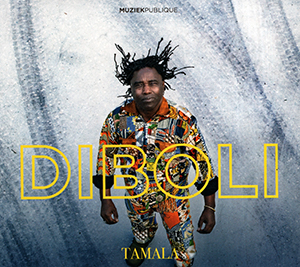Het kwartet Tamala slaat een brug tussen het West-Afrikaanse heden en verleden.
English version below
Het trio Tamala bestaat uit de Senegalese musici Mola Sylla en Bao Sissoko, de Vlaamse violist Wouter Vandenabeele. Voor hun derde album Diboli is het trio uitgebreid tot kwartet met gitarist en mondharmonicaspeler Olivier Vander Bauwede.
De muziek op Diboli is een eerbetoon aan alle ‘vergeten’ musici die hebben bijgedragen aan de hedendaagse West-Afrikaanse muziekcultuur. Diboli is de naam van het dorp, op de grens van Senegal en Mali, waar de voorouders van Sylla vandaan komen.
De composities zijn veelal geschreven door kora (Afrikaanse harp)speler Bao Sissoko op teksten van Mola Sylla die handelen over natuurlijke geneeswijze, dankbaarheid, jaloezie, oogsten en, natuurlijk, de liefde. Alle stukken zijn liederen, behalve in Alkebukan, zoals Afrika vroeger werd genoemd en ‘Moeder van de mensheid’ betekent. Dit is een instrumentaal loflied dat via een oerwoud-soundscape uitmondt in een opzwepende dans, ondersteund door calabas, mondharmonica-ritmes en viool-sequens.
Het virtuoze kora-spel van Sissoko staat centraal op Diboli. De muziek is enerzijds energiek (May ma Sara) met veel voor- en nazang waarbij de viool prachtige variaties speelt op de melodie met hier en daar aanvullende thematiek. Dit in tegenstelling tot, bijvoorbeeld, het titelstuk Diboli, dat een bijna hypnotiserende werking heeft, met bevlogen zang en solo’s op kora, viool en mondharmonica. In de rustige compositie Xeesal (met prachtig kora- en vioolspel) klinkt een kleurige mondharmonica, als een prachtig fluwelen bed op de achtergrond van de vioolsolo.
Diboli blikt muzikaal terug naar het oude Afrika, met een open visie naar de toekomst: waar de Afrikaanse instrument als de kora, kalimba en kalebas moeiteloos versmelten met viool, gitaar en mondharmonica en waar Afrikaanse muziek moeiteloos versmelt met folk en blues in een bevlogen eerbetoon dat schitterende muziek oplevert.
English version
The quartet Tamala builds a bridge between the West African in the present and the past.
The trio Tamala consists of the Senegalese musicians Mola Sylla and Bao Sissoko, the Flemish violinist Wouter Vandenabeele. For their third album Diboli, the trio was expanded to a quartet with guitarist and harmonica player Olivier Vander Bauwede.
The music on Diboli is a tribute to all the ‘forgotten’ musicians who have contributed to contemporary West African music culture. Diboli is the name of the village, on the border of Senegal and Mali, where Sylla’s ancestors come from.
The compositions are mostly written by kora (African harp) player Bao Sissoko on texts by Mola Sylla that deal with natural healing, gratitude, jealousy, harvesting and, of course, love. All the pieces are songs, except in Alkebukan, as Africa used to be called and means ‘Mother of Mankind’. This is an instrumental song of praise that, via a jungle soundscape, ends in a stirring dance, supported by calabas, harmonica rhythms and violin sequence.
Sissoko’s virtuoso kora playing is central on the album Diboli. On the one hand, the music is energetic (May ma Sara) with a lot of call- and respond singing, in which the violin plays beautiful variations on the melody with additional themes here and there. This is in contrast to, for example, the title piece Diboli, which has an almost hypnotic effect, with passionate singing and solos on kora, violin and harmonica. In the quiet composition Xeesal (with beautiful kora and violin playing), a colorful harmonica sounds like a velvet bed, beautifully in the background of the violin solo.
Diboli musically looks back to old Africa, with an open vision to the future: where African instruments such as the kora, kalimba and gourd effortlessly merge with violin, guitar and harmonica, where African music effortlessly merges with folk and blues in an inspired tribute that produces beautiful music.
- Tamala: Diboli (muziekpublique/Xango)
© Mattie Poels.


Geen reacties